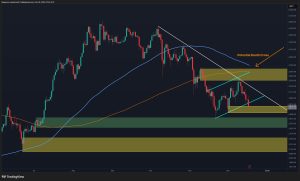Ripple gains another victory in the ongoing lawsuit, as the court has dismissed the U.S. Securities Exchange Commission’s (SEC) latest bid to strike Ripple’s fair notice affirmative defense.
Sur-Sur-Reply Motion Denied
The latest development in the SEC vs XRP case has been in favor of the fintech company, as Judge Analisa Torres denied the SEC’s request to file its Sur-Sur-Reply, based on the outcome of a similar case against blockchain content platform LBRY. The magistrate judge ruling over this other case had ruled on the pleadings on unconnected “selective enforcement” defense. However, Ripple’s lawyers argued that its fair notice defense should not be attacked by the SEC based on “out of circuit” recently-decided cases. The lawyers also pointed out the SEC’s double standard as it had not moved to strike against LBRY’s fair notice defense plea. The lack of action had also not been mentioned in the SEC’s proposed Sur-Sur-Reply. However, the Ripple team won this round as Judge Torres dismissed the SEC’s request.
Former federal prosecutor and defense lawyer James K. Filan tweeted,
“In a one-word order, District Judge Torres has DENIED the SEC’s Motion to File a Sur Sur-Reply in Support of its Motion to Strike.”
Lawsuit Tipping In Favor Of Ripple
The lawsuit between Ripple and SEC has been going on since December of 2020. Despite a lack of concrete rulings, the many twists and turns have been keeping the crypto community glued to the intricacies of this legal battle. However, there is a sense of relief among the Ripple community with regard to the lawsuit, since it does appear to be leaning favorably towards the fintech company. The court has granted Ripple the permission to plead multiple motions that would strengthen its case.
Judge Orders Release Of Sealed Memos
Most recently, Judge Torres had ordered the release of two memos dating back to 2012, that were monumental in establishing that XRP does not constitute securities as per Ripple’s general counsel, Perkins Coie. Citing the memos, Ripple was able to argue that they did not establish as a matter of undisputed fact that the fintech firm had constitutionally adequate notice that the SEC would view XRP as a security. The SEC had claimed that Ripple had ignored the warnings contained in the memos and had continued selling XRP from 2013 to 2020.
However, a former SEC insider, Joseph Hall, believes that the regulator is likely to lose the lawsuit, especially if Judge Torres questions the SEC’s delayed response to its concerns about Ripple’s activities since 2012.
Disclaimer: This article is provided for informational purposes only. It is not offered or intended to be used as legal, tax, investment, financial, or other advice.





















